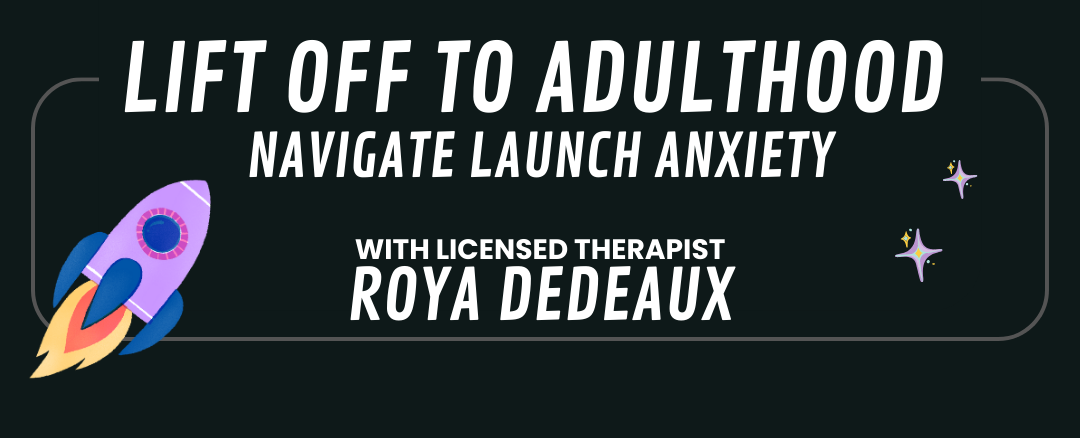Navigating the Teenage Years: Understanding and Managing Boundary-Pushing Behavior
Roya Dedeaux, MS, LMFT
why does your teen push your buttons? how do you navigate boundaries with your teenager? Read more to find out!

This sounds dramatic - but it was the first floor and there was a garden hose box right below, which made for a very easy step. Once I hit the ground, I ran barefoot across the front lawn to the front door and knocked on it. When my very confused father opened it I said, “I don’t WANT to sneak out but I just wanted you to know I COULD.”
As parents, we often feel like our teens are constantly testing the limits, pushing boundaries just to see how far they can go. This behavior can be challenging and sometimes frustrating, and it is hard not to take it personally. It’s so important for parents to remember that pushing boundaries is a natural part of adolescence.
Understanding why teens push boundaries and learning how to manage this behavior effectively can help maintain a healthy parent-teen relationship and guide your teenager towards responsible adulthood. Figuring out how to be on your teen’s team as they do this very healthy developmental task will also mean you can protect your relationship with them - which is ultimately the most important thing for their safety and success.
Why Do Teens Push Boundaries?
1. Seeking Independence
Do you remember when your teen was three years old and they wanted to “do it myself” all the time? No way they’d let you pour a bowl of cereal and give it to them - they’d grab the cereal box so that cheerios scatter across the floor. They’d spill more milk on the counter than would get in the bowl. Beyond breakfast, they’ll put shoes on the wrong feet, dress themselves inside out and backwards, try to paint the coffee table with honey (ask me how I know), and generally make chaos and mess all for the sake of autonomy and independence.
When they’re toddlers we try to give them as much autonomy as they can because we understand that they’re building motor skills and their own sense of self is beginning to assert itself. It’s an important part of a kid feeling capable, even if it’s a constant mess for us to clean up.
Teenagers are doing the same thing - just a decade older, the chaos and mess are more sophisticated (and a little scarier).
Teenagers are in a developmental stage where they are striving for independence. It’s their task at this age to figure out their own identity, which means they need to assert their autonomy, which means they need to push up against boundaries and expectations that others have placed on them.
Boundary pushing helps them learn about their limits, understand consequences, and ultimately understand their own wants and needs.

2. Brain Development
When your toddler first started learning to speak, did they say every word correctly? Nope. They had cute little mistakes that went down in the family lore, right? They’d switch letters around, make up combinations of words - because their brains were still developing and they were taking in a LOT of information.
Similarly, the teenage brain is still developing, particularly the prefrontal cortex, which is responsible for decision-making, impulse control, and understanding consequences.
Think back on your own teenage years - lots of adults mention how they felt like an entirely different person back then. Of course you did - your brain wasn’t done yet.
This development phase can lead to risk-taking behavior and testing boundaries - and it’s important to remember that this too, is healthy and normal and part of growing up.
3. Peer Influence
The idea of peer influence isn’t a little known secret - but we often talk about peer pressure as purely a negative. In fact, caring deeply about what friends think is also a very normal and healthy part of development.

At this stage of life, teens are trying to differentiate themselves from their families, but they still want belonging. They are figuring out where they can find others like them - it’s like holding up a whole group full of mirrors in order to see themselves and their values, wants, and needs reflected back at themselves.
It makes sense that teens would be influenced by their peers. It also makes sense that they might prioritize those connections over parental or familial ones. They might push back against parent-set boundaries in order to gain acceptance by their peers - but sometimes it might not even be done consciously.
Check out this 30 minute webinar for parents on helping their teens navigate their big feelings. This is often where parents get triggered and this webinar gives you practical tools for handling that!
4. Curiosity and Experimentation
Discovering who you are is the whole point of being a teenager. Adolescence is a time of exploration. Teens are naturally curious and may push boundaries as a way to experiment and discover new things about themselves and the world around them. I can’t even tell you the number of teens I have worked with who decide to become vegetarian, after eating meat their whole life - and vice versa. Teens who grew up in vegetarian households do the opposite! They try out different political beliefs from their parents, they dive deep into music, into scenes, into aesthetics.
It can be hard for parents to keep up with this sort of experimentation, but it’s part of figuring yourself out. Because this kind of experimentation can often go directly in opposition to a parent’s value system, it can be extra hard to remember that it isn’t about you. It’s about them. It’s about them figuring out who they are - and sometimes they have to swing the pendulum to the extreme farthest distance away from where they came from to figure that out.
In yet another how-toddlers-are-just-like-your-teenager-example, when my sister was 5, she would come out to the living room every day and declare which fairytale character she was. We weren’t allowed to call her anything else, only Cinderella or Snow White, or Red Riding Hood, or whichever person she was embodying that day.

Teenagers are doing the same sort of trying-on-make-believe-characters, except - it’s not exactly playing pretend. They are trying on the mantle of who they could be. Sometimes it takes a full-bodied decision about who you are right now to learn about who that person is and if you want to keep being them. Just like my little sister, your teen might decide to try something new the next day.
Parents will sometimes tell me, “I don’t recognize my kid anymore” when their teen starts doing some of this boundary-pushing behavior. I give a lot of examples of how their teenage-hood is similar to toddler-hood, because I think it’s easier to recognize your child in their new teenage behavior when you remember this isn’t the first time they’ve pushed your buttons and boundaries. I want parents to also remember that it’s a time that teenagers don’t always recognize themselves either. Big changes happen in the teenage years - not just physically, but their social and emotional worlds can change in moments.
If you’re full up with understanding the why behind their boundary-pushing behavior and want to know how to be the best parent you can be while keeping your relationship at the forefront - you’ll find helpful exercises and practical tools in this 20+ Parenting Guide to Navigating Launch Anxiety available as an instant download here!
More tools for parents of teens
Now that we've explored some of the key components for parents trying to help their teenagers through boundary pushing behavior, check out your own FREE Parenting Guide to Navigating the Lift Off to Adulthood!

Roya Dedeaux is a Licensed Marriage and Family Therapist with a focus on using creative tools like art, writing, and recreation as a way to help teens and their families navigate adulthood anxiety.
Roya loves running her private practice, her online art group for teens, and helping teens & their parents through her various workshops and webinars! When she's not doing that, she loves to make messes with her three wild & wonderful kids where they live and play hard in Southern California.
Check out more about Roya, therapist, author, & speaker at
www.launchanxiety.com
Launch AnxietyBlog


